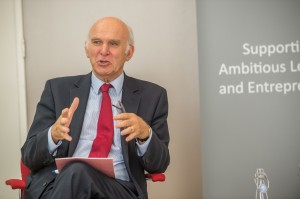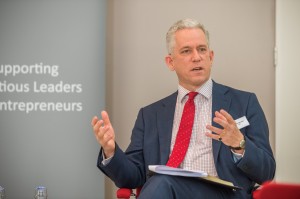The UK could ‘self-harm’ from a post-Brexit attitude to foreign workers being encouraged by Theresa May’s government, former Business Secretary Sir Vince Cable has told Bristol business leaders.
Leaving the EU could also have a ‘sting in the tail’ for those who voted for it thinking it would lead to more free trade and less red tape as it is likely to mean the opposite, he told an event organised by the Institute of Directors (IoD). 
The former Twickenham MP, pictured right, who lost his seat at the 2015 General Election, was in Bristol to promote his latest book After the Storm, a sequel to his highly praised 2009 analysis of the worldwide banking crash The Storm.
In conversation with the Institute of Directors’ chief economist James Sproule, pictured below, Sir Vince spoke about the on-going impact of the banking crisis and the challenges facing the UK economy.
But, as a staunch ‘remainer’, he was most critical about the government’s planning for Brexit, particularly its adoption of what he called the ‘Home Office view” of immigration.
He said as the coalition government’s Secretary of State for Business, Innovation and Skills from 2010 to 2015, he had tried to make it easier for important industries, such as the tech sector, to bring in skilled workers from overseas to plug gaps in their workforce.
 “We had a big skills problem, particularly in hi-tech,” he said. “There was a big demand for people with computer engineering skills but it was also the highest group of graduates who were unemployed. This was because our universities were running courses that were 10 years out of date and graduates didn’t have skills like coding.
“We had a big skills problem, particularly in hi-tech,” he said. “There was a big demand for people with computer engineering skills but it was also the highest group of graduates who were unemployed. This was because our universities were running courses that were 10 years out of date and graduates didn’t have skills like coding.
“So companies in London and here in Bristol dealt with that by bringing in people from overseas. But then we came up against the Home Office. It was almost comical.”
The view of the Home Office, under the then Home Secretary Theresa May but continuing now she is Prime Minister, was to “keep foreigners out”, he told the event, hosted by law firm Burges Salmon in its Bristol head office.
“Of all government policies, this is the one that is going to do us most self-harm.”
He also said there was an “irony” of Brexit in that people voted for it thinking it would encourage free trade and a cut in red tape.
“But it may have the opposite effect,” he said. “Exporters will have to fill in a lot more forms.”
He also said the “psychology” of a government led by Theresa May – unlike that of David Cameron – was for more State control. This would probably mean Chancellor Philip Hammond investing in infrastructure.
But this was unlikely to help the UK’s record on productivity – which was held back by a lack of skills and innovation but was also partly the fault of a UK banking system which did not invest in small, growing businesses.
As Business Secretary he had tried to solve this – and was backed most of the time by former Chancellor George Osborne.
“The banking system in the UK was unfriendly to small businesses,” he said. “We did some interesting things like encouraging challenger banks, setting up the Business Growth Fund and the British Business Bank.
“But now the bigger banks are retreating again and it’s difficult to have a dynamic SME sector if that happens.”
As Business Secretary he had always been moved by the energy of the entrepreneurs he met when he visited places like Bristol.
But while he had tried to encourage entrepreneurialism, other coalition government measures had the opposite effect, such as the “thoughtless reform” of the planning system which had encouraged the wholesale conversion of commercial buildings for residential use.
“As a result, it’s driving up commercial rents for things like incubators,” he said.
Bristol IoD branch chair Rebecca Tregarthen said: “It’s not often you get two of the country’s leading economists on the same stage so we were extremely fortunate to be able to host this event.
“Clearly, we are moving into another challenging economic period, and one of much uncertainty. It is evident we still have work to do in addressing areas such as skills shortages in key sectors.
“But there is much to be positive about. As Sir Vince commented, Bristol is seen as the most active urban economy outside London. We have a resilient business community in the West, many of whom are small-to-medium sized enterprises who have the agility to deal with challenge and change.”






























